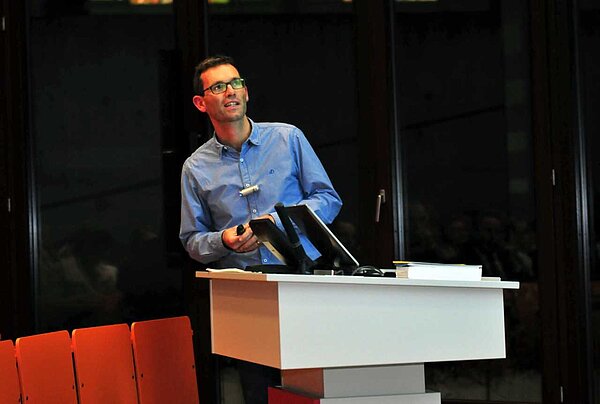Nuclear waste disposal search in Germany - political insights

Nuclear waste disposal search in Germany - political insights
On the second date of the lecture series Resource Efficiency and Sustainability in the winter semester 2018/19 Prof. Dr. Hendrik Lambrecht from the University of Applied Sciences Pforzheim spoke about the search for nuclear waste disposal sites in Germany. Hendrik Lambrecht is a citizen's representative in the National Support Committee for the Search for Repository and shared his experiences with the audience during the lecture.
Searching for repositories in Germany - what is it all about? Following the nuclear catastrophe in Fukushima in 2011, the German government decided to phase out nuclear energy, which is why all nuclear power plants in Germany are to be taken off the grid by 2022. Nuclear energy is associated with the problem of highly radioactive nuclear waste, which must be safely stored for millions of years - an unimaginable time dimension.
The search for a repository or the best possible location for it is both a technical and a social challenge, in which the interests of the general public and individual interests inevitably collide.
In contrast to the location Gorleben, which was simply decided by the Federal Government at the end of the 1970s, the new repository is to be found through a transparent and participative selection process. The aim is to achieve a high level of acceptance of the site.
In order to provide the audience with a basis for assessing the hazardousness of high-level radioactive waste, Mr. Lambrecht first gave a brief overview of the question "What is radioactivity?". It became clear that, depending on the type of radiation, its activity and half-life, nuclear waste is divided into low-, medium- and high-level radioactive waste. In Germany, about 27,000 m³ of high-level radioactive waste have been produced in the last 50 years, which corresponds to 10 % of the total amount of radioactive waste, but this 10 % represents 99.9 % of the activity.
The danger posed by nuclear waste is ionising radiation. Not perceptible to our senses, it can lead acutely to radiation sickness or death or, in the long term, to genetic alterations or cancer.
In the past, various, sometimes utopian-looking approaches to dealing with radioactive waste have been discussed, such as shipment into space or confinement in the Arctic ice. Worldwide, however, storage in deep geological formations has gained acceptance. In addition to protective containers, the rock barriers are intended to prevent the migration of radioactive substances.
The site selection procedure and the framework conditions to be fulfilled are laid down in the site selection law. Mr. Lambrecht explained that the search began with a "white" map in which possible sites are currently being identified by evaluating millions of geological data sets. Possible host rocks in Germany are salt, granite and clay, all of which have specific advantages and disadvantages. Areas with seismic activities, former mining areas and mountain formations with young groundwater deposits are excluded as locations. In the following phases of the repository search, sites that will be shortlisted will first be explored above ground and later underground in order to successively obtain more and more specific information about the potential repository site.
The experience of civil war-like conditions during demonstrations on nuclear waste transports and nuclear facilities has led to the conclusion that this time the public must be more involved in the ongoing site search. For this reason, the National Monitoring Committee, to which Mr Lambrecht also belongs, was set up. The committee consists of citizens representing the categories "man", "woman" and "young generation" as well as respected public figures. For the selection of citizens, 70,000 random telephone calls were conducted throughout Germany, citizens' forums were convened and finally six representatives were elected in a multi-stage procedure. Mr. Lambrecht emphasized that the accompanying committee is by no means a self-runner, but that adequate public participation is a challenging task that requires great commitment from its members. Among other things, the Monitoring Committee organises workshops on current topics in the search for locations in various cities in order to reach as broad a public as possible. The aim is to prevent people from waking up when they are affected and it is too late. The population should be involved in the process much earlier. So it is first and foremost about participation and not about unanimous acceptance.
Finally, Mr. Lambrecht summarized his thoughts on the project. He sees the search for a repository and the storage of nuclear waste as one of the greatest scientific and technical projects of our time and the answer to one of the greatest environmental problems in Germany. He described the National Monitoring Committee as a highly exciting political "experiment" with the aim of finding a viable solution for a highly controversial and complex task for society as a whole.
